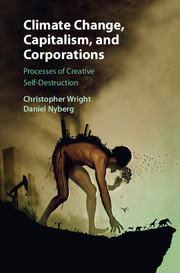Book contents
- Frontmatter
- Dedication
- Contents
- List of figures
- List of tables
- Foreword
- Acknowledgements
- 1 Climate change and corporate capitalism
- 2 Creative self-destruction and the incorporation of critique
- 3 Climate change and the corporate construction of risk
- 4 Corporate political activity and climate coalitions
- 5 Justification, compromise, and corruption
- 6 Climate change, managerial identity, and narrating the self
- 7 Emotions, corporate environmentalism, and climate change
- 8 Political myths and pathways forward
- 9 Imagining alternatives
- Appendix
- References
- Index
Foreword
Published online by Cambridge University Press: 05 October 2015
- Frontmatter
- Dedication
- Contents
- List of figures
- List of tables
- Foreword
- Acknowledgements
- 1 Climate change and corporate capitalism
- 2 Creative self-destruction and the incorporation of critique
- 3 Climate change and the corporate construction of risk
- 4 Corporate political activity and climate coalitions
- 5 Justification, compromise, and corruption
- 6 Climate change, managerial identity, and narrating the self
- 7 Emotions, corporate environmentalism, and climate change
- 8 Political myths and pathways forward
- 9 Imagining alternatives
- Appendix
- References
- Index
Summary
In his 2006 landmark report on how we should respond to the climate crisis, Nicholas Stern characterised global warming as an ‘externality’, a damage to others due to market activity whose cost is not met by those who cause it. Indeed, Stern characterised climate change as ‘the largest ever market failure’. In other words, the problem of global warming arises because the market system is not working well enough, and if we could find a way to correct the fault then the problem would be solved.
It was a geophysicist, Brad Werner, who in 2012 argued precisely the opposite case – that we are in this mess not because the market system is not working well enough but because it is working too well. Werner's startling presentation to the annual conference of the American Geophysical Union was titled ‘Is the Earth F**ked?’ and he posed in public the question climate scientists and others who follow their work had been asking in private. His answer was bleak, or just possibly inspirational.
Building on the fact that humans now constitute a force of nature so powerful that we have caused the Earth to enter a new geological epoch, the Anthropocene, Werner approaches the question of the sustainability of humankind through a dynamic model known as a global, coupled human-environmental system. The activities of humans are captured in a module called ‘the dominant global culture’, which essentially describes the globally integrated market system of resource use and waste generation driven by the relentless need to grow. He also included a representation of the political institutions that facilitate the smooth operation of the system.
The essential problem, Werner argued, is that there is a mismatch between the short timescales of markets, and the political systems tied to them, and the much longer timescales that the Earth system needs to accommodate human activity, including soaking up our carbon dioxide and other wastes. Technological progress and globalisation of finance, transport, and communications have oiled the wheels of the human components of the planetary system allowing it to speed up. But the pace of the natural system carries on as it always has. The problem is not Stern's market failure but market success.
- Type
- Chapter
- Information
- Climate Change, Capitalism, and CorporationsProcesses of Creative Self-Destruction, pp. x - xiiPublisher: Cambridge University PressPrint publication year: 2015
- 1
- Cited by



